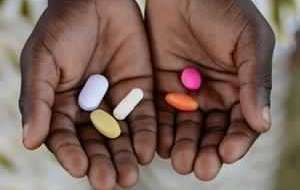Thulani Sibiya (23), a young man from Mpumalanga, who was diagnosed with HIV and advised to start anti-retroviral treatment, chose instead to please his family and turn to the church for help.
Prayers and holy water
Now Thulani is sick, has lost weight and has to face his family’s rejection if he chooses to take the treatment he needs in order to fight the virus. His story, according to the healthcare worker treating him, is not unusual as many young people find themselves having to face down the stigma of Aids.
When Sibiya told his mother he was HIV positive, she refused to accept the news and chose instead to take him to church for prayers and holy water.
Despite knowing about the HI virus and that he needed medical treatment, Sibiya chose instead to please those closest to him and to rather trust that they had his best interests at heart.
But as time passed, Sibiya grew sick and started losing weight despite his attending church with his mother. He felt his family did not understand his illness and were treating him as though he was cursed.
“By that time I knew I had to do something about my sickness, because I could no longer expect support from my family. I went to the clinic. My blood was taken and sputum for a TB test. My CD4 count results came back 117 and the TB test was negative. I was put on treatment immediately, but it hasn’t been easy,” Sibiya said.
ARV at a late stage
He said when he was tested positive for HIV he was aware of the importance of a good diet and lifestyle.
But as the years passed without treatment, stress began to overwhelm him.
“I neglected my health, started eating unhealthy food, smoking and drinking alcohol. Deep down in my heart I knew it was bad. My unhealthy body started failing to fight off disease and infections and my viral load became high. I got sick and I needed to started ARV’s immediately,” Sibiya said, explaining how he became increasingly aware of the need to properly handle his HIV status.
“Because I eventually started ARV treatment at a late stage with a weak immune system and high viral load, I know recovering will take a long time and it won’t be easy to fight sickness. That’s why I have been experiencing late HIV symptoms such as peripheral neuropathy, diarrhoea, coughing, weight loss, fever and tiredness,” Sibiya said.
But his mother, Thokozile Sibiya, still does not believe her son cannot be healed by the church.
Lack of support
“After drinking church water I received the answer to my prayers. My high blood pressure has been stable and I have not taken a pill ever since. What’s wrong with having faith? I have that same faith and hope for my son,” she said.
Lay counsellor Doris Nkosi said many HIV sufferers experienced a similar lack of support from their families.
“The reason why some HIV positive people die, and why some don’t want to start treatment is because of the negative influence of family members who do not accept their HIV status. Once you test HIV positive there is no holy water or prayers that can change your status, because there is no cure for HIV. But with healthy living and the right drugs it can be managed,” Nkosi said.
Sibiya said: “My advice to other people like me who are living with HIV is: Don’t wait until you become sick to start treatment, because it is not worth it at the end.” – Health-e News.
Thulani Sibiya (23), a young man from Mpumalanga, who was diagnosed with HIV and advised to start anti-retroviral treatment, chose instead to please his family and turn to the church for help.
Prayers and holy water
Now Thulani is sick, has lost weight and has to face his family’s rejection if he chooses to take the treatment he needs in order to fight the virus. His story, according to the healthcare worker treating him, is not unusual as many young people find themselves having to face down the stigma of Aids.
When Sibiya told his mother he was HIV positive, she refused to accept the news and chose instead to take him to church for prayers and holy water.
Despite knowing about the HI virus and that he needed medical treatment, Sibiya chose instead to please those closest to him and to rather trust that they had his best interests at heart.
But as time passed, Sibiya grew sick and started losing weight despite his attending church with his mother. He felt his family did not understand his illness and were treating him as though he was cursed.
“By that time I knew I had to do something about my sickness, because I could no longer expect support from my family. I went to the clinic. My blood was taken and sputum for a TB test. My CD4 count results came back 117 and the TB test was negative. I was put on treatment immediately, but it hasn’t been easy,” Sibiya said.
ARV at a late stage
He said when he was tested positive for HIV he was aware of the importance of a good diet and lifestyle.
But as the years passed without treatment, stress began to overwhelm him.
“I neglected my health, started eating unhealthy food, smoking and drinking alcohol. Deep down in my heart I knew it was bad. My unhealthy body started failing to fight off disease and infections and my viral load became high. I got sick and I needed to started ARV’s immediately,” Sibiya said, explaining how he became increasingly aware of the need to properly handle his HIV status.
“Because I eventually started ARV treatment at a late stage with a weak immune system and high viral load, I know recovering will take a long time and it won’t be easy to fight sickness. That’s why I have been experiencing late HIV symptoms such as peripheral neuropathy, diarrhoea, coughing, weight loss, fever and tiredness,” Sibiya said.
But his mother, Thokozile Sibiya, still does not believe her son cannot be healed by the church.
Lack of support
“After drinking church water I received the answer to my prayers. My high blood pressure has been stable and I have not taken a pill ever since. What’s wrong with having faith? I have that same faith and hope for my son,” she said.
Lay counsellor Doris Nkosi said many HIV sufferers experienced a similar lack of support from their families.
“The reason why some HIV positive people die, and why some don’t want to start treatment is because of the negative influence of family members who do not accept their HIV status. Once you test HIV positive there is no holy water or prayers that can change your status, because there is no cure for HIV. But with healthy living and the right drugs it can be managed,” Nkosi said.
Sibiya said: “My advice to other people like me who are living with HIV is: Don’t wait until you become sick to start treatment, because it is not worth it at the end.” – Health-e News.
Thulani Sibiya (23), a young man from Mpumalanga, who was diagnosed with HIV and advised to start anti-retroviral treatment, chose instead to please his family and turn to the church for help.
Prayers and holy water
Now Thulani is sick, has lost weight and has to face his family’s rejection if he chooses to take the treatment he needs in order to fight the virus. His story, according to the healthcare worker treating him, is not unusual as many young people find themselves having to face down the stigma of Aids.
When Sibiya told his mother he was HIV positive, she refused to accept the news and chose instead to take him to church for prayers and holy water.
Despite knowing about the HI virus and that he needed medical treatment, Sibiya chose instead to please those closest to him and to rather trust that they had his best interests at heart.
But as time passed, Sibiya grew sick and started losing weight despite his attending church with his mother. He felt his family did not understand his illness and were treating him as though he was cursed.
“By that time I knew I had to do something about my sickness, because I could no longer expect support from my family. I went to the clinic. My blood was taken and sputum for a TB test. My CD4 count results came back 117 and the TB test was negative. I was put on treatment immediately, but it hasn’t been easy,” Sibiya said.
ARV at a late stage
He said when he was tested positive for HIV he was aware of the importance of a good diet and lifestyle.
But as the years passed without treatment, stress began to overwhelm him.
“I neglected my health, started eating unhealthy food, smoking and drinking alcohol. Deep down in my heart I knew it was bad. My unhealthy body started failing to fight off disease and infections and my viral load became high. I got sick and I needed to started ARV’s immediately,” Sibiya said, explaining how he became increasingly aware of the need to properly handle his HIV status.
“Because I eventually started ARV treatment at a late stage with a weak immune system and high viral load, I know recovering will take a long time and it won’t be easy to fight sickness. That’s why I have been experiencing late HIV symptoms such as peripheral neuropathy, diarrhoea, coughing, weight loss, fever and tiredness,” Sibiya said.
But his mother, Thokozile Sibiya, still does not believe her son cannot be healed by the church.
Lack of support
“After drinking church water I received the answer to my prayers. My high blood pressure has been stable and I have not taken a pill ever since. What’s wrong with having faith? I have that same faith and hope for my son,” she said.
Lay counsellor Doris Nkosi said many HIV sufferers experienced a similar lack of support from their families.
“The reason why some HIV positive people die, and why some don’t want to start treatment is because of the negative influence of family members who do not accept their HIV status. Once you test HIV positive there is no holy water or prayers that can change your status, because there is no cure for HIV. But with healthy living and the right drugs it can be managed,” Nkosi said.
Sibiya said: “My advice to other people like me who are living with HIV is: Don’t wait until you become sick to start treatment, because it is not worth it at the end.” – Health-e News.
Thulani Sibiya (23), a young man from Mpumalanga, who was diagnosed with HIV and advised to start anti-retroviral treatment, chose instead to please his family and turn to the church for help.
Prayers and holy water
Now Thulani is sick, has lost weight and has to face his family’s rejection if he chooses to take the treatment he needs in order to fight the virus. His story, according to the healthcare worker treating him, is not unusual as many young people find themselves having to face down the stigma of Aids.
When Sibiya told his mother he was HIV positive, she refused to accept the news and chose instead to take him to church for prayers and holy water.
Despite knowing about the HI virus and that he needed medical treatment, Sibiya chose instead to please those closest to him and to rather trust that they had his best interests at heart.
But as time passed, Sibiya grew sick and started losing weight despite his attending church with his mother. He felt his family did not understand his illness and were treating him as though he was cursed.
“By that time I knew I had to do something about my sickness, because I could no longer expect support from my family. I went to the clinic. My blood was taken and sputum for a TB test. My CD4 count results came back 117 and the TB test was negative. I was put on treatment immediately, but it hasn’t been easy,” Sibiya said.
ARV at a late stage
He said when he was tested positive for HIV he was aware of the importance of a good diet and lifestyle.
But as the years passed without treatment, stress began to overwhelm him.
“I neglected my health, started eating unhealthy food, smoking and drinking alcohol. Deep down in my heart I knew it was bad. My unhealthy body started failing to fight off disease and infections and my viral load became high. I got sick and I needed to started ARV’s immediately,” Sibiya said, explaining how he became increasingly aware of the need to properly handle his HIV status.
“Because I eventually started ARV treatment at a late stage with a weak immune system and high viral load, I know recovering will take a long time and it won’t be easy to fight sickness. That’s why I have been experiencing late HIV symptoms such as peripheral neuropathy, diarrhoea, coughing, weight loss, fever and tiredness,” Sibiya said.
But his mother, Thokozile Sibiya, still does not believe her son cannot be healed by the church.
Lack of support
“After drinking church water I received the answer to my prayers. My high blood pressure has been stable and I have not taken a pill ever since. What’s wrong with having faith? I have that same faith and hope for my son,” she said.
Lay counsellor Doris Nkosi said many HIV sufferers experienced a similar lack of support from their families.
“The reason why some HIV positive people die, and why some don’t want to start treatment is because of the negative influence of family members who do not accept their HIV status. Once you test HIV positive there is no holy water or prayers that can change your status, because there is no cure for HIV. But with healthy living and the right drugs it can be managed,” Nkosi said.
Sibiya said: “My advice to other people like me who are living with HIV is: Don’t wait until you become sick to start treatment, because it is not worth it at the end.” – Health-e News.
Thulani Sibiya (23), a young man from Mpumalanga, who was diagnosed with HIV and advised to start anti-retroviral treatment, chose instead to please his family and turn to the church for help.
Prayers and holy water
Now Thulani is sick, has lost weight and has to face his family’s rejection if he chooses to take the treatment he needs in order to fight the virus. His story, according to the healthcare worker treating him, is not unusual as many young people find themselves having to face down the stigma of Aids.
When Sibiya told his mother he was HIV positive, she refused to accept the news and chose instead to take him to church for prayers and holy water.
Despite knowing about the HI virus and that he needed medical treatment, Sibiya chose instead to please those closest to him and to rather trust that they had his best interests at heart.
But as time passed, Sibiya grew sick and started losing weight despite his attending church with his mother. He felt his family did not understand his illness and were treating him as though he was cursed.
“By that time I knew I had to do something about my sickness, because I could no longer expect support from my family. I went to the clinic. My blood was taken and sputum for a TB test. My CD4 count results came back 117 and the TB test was negative. I was put on treatment immediately, but it hasn’t been easy,” Sibiya said.
ARV at a late stage
He said when he was tested positive for HIV he was aware of the importance of a good diet and lifestyle.
But as the years passed without treatment, stress began to overwhelm him.
“I neglected my health, started eating unhealthy food, smoking and drinking alcohol. Deep down in my heart I knew it was bad. My unhealthy body started failing to fight off disease and infections and my viral load became high. I got sick and I needed to started ARV’s immediately,” Sibiya said, explaining how he became increasingly aware of the need to properly handle his HIV status.
“Because I eventually started ARV treatment at a late stage with a weak immune system and high viral load, I know recovering will take a long time and it won’t be easy to fight sickness. That’s why I have been experiencing late HIV symptoms such as peripheral neuropathy, diarrhoea, coughing, weight loss, fever and tiredness,” Sibiya said.
But his mother, Thokozile Sibiya, still does not believe her son cannot be healed by the church.
Lack of support
“After drinking church water I received the answer to my prayers. My high blood pressure has been stable and I have not taken a pill ever since. What’s wrong with having faith? I have that same faith and hope for my son,” she said.
Lay counsellor Doris Nkosi said many HIV sufferers experienced a similar lack of support from their families.
“The reason why some HIV positive people die, and why some don’t want to start treatment is because of the negative influence of family members who do not accept their HIV status. Once you test HIV positive there is no holy water or prayers that can change your status, because there is no cure for HIV. But with healthy living and the right drugs it can be managed,” Nkosi said.
Sibiya said: “My advice to other people like me who are living with HIV is: Don’t wait until you become sick to start treatment, because it is not worth it at the end.” – Health-e News.
Thulani Sibiya (23), a young man from Mpumalanga, who was diagnosed with HIV and advised to start anti-retroviral treatment, chose instead to please his family and turn to the church for help.
Prayers and holy water
Now Thulani is sick, has lost weight and has to face his family’s rejection if he chooses to take the treatment he needs in order to fight the virus. His story, according to the healthcare worker treating him, is not unusual as many young people find themselves having to face down the stigma of Aids.
When Sibiya told his mother he was HIV positive, she refused to accept the news and chose instead to take him to church for prayers and holy water.
Despite knowing about the HI virus and that he needed medical treatment, Sibiya chose instead to please those closest to him and to rather trust that they had his best interests at heart.
But as time passed, Sibiya grew sick and started losing weight despite his attending church with his mother. He felt his family did not understand his illness and were treating him as though he was cursed.
“By that time I knew I had to do something about my sickness, because I could no longer expect support from my family. I went to the clinic. My blood was taken and sputum for a TB test. My CD4 count results came back 117 and the TB test was negative. I was put on treatment immediately, but it hasn’t been easy,” Sibiya said.
ARV at a late stage
He said when he was tested positive for HIV he was aware of the importance of a good diet and lifestyle.
But as the years passed without treatment, stress began to overwhelm him.
“I neglected my health, started eating unhealthy food, smoking and drinking alcohol. Deep down in my heart I knew it was bad. My unhealthy body started failing to fight off disease and infections and my viral load became high. I got sick and I needed to started ARV’s immediately,” Sibiya said, explaining how he became increasingly aware of the need to properly handle his HIV status.
“Because I eventually started ARV treatment at a late stage with a weak immune system and high viral load, I know recovering will take a long time and it won’t be easy to fight sickness. That’s why I have been experiencing late HIV symptoms such as peripheral neuropathy, diarrhoea, coughing, weight loss, fever and tiredness,” Sibiya said.
But his mother, Thokozile Sibiya, still does not believe her son cannot be healed by the church.
Lack of support
“After drinking church water I received the answer to my prayers. My high blood pressure has been stable and I have not taken a pill ever since. What’s wrong with having faith? I have that same faith and hope for my son,” she said.
Lay counsellor Doris Nkosi said many HIV sufferers experienced a similar lack of support from their families.
“The reason why some HIV positive people die, and why some don’t want to start treatment is because of the negative influence of family members who do not accept their HIV status. Once you test HIV positive there is no holy water or prayers that can change your status, because there is no cure for HIV. But with healthy living and the right drugs it can be managed,” Nkosi said.
Sibiya said: “My advice to other people like me who are living with HIV is: Don’t wait until you become sick to start treatment, because it is not worth it at the end.” – Health-e News.
Thulani Sibiya (23), a young man from Mpumalanga, who was diagnosed with HIV and advised to start anti-retroviral treatment, chose instead to please his family and turn to the church for help.
Prayers and holy water
Now Thulani is sick, has lost weight and has to face his family’s rejection if he chooses to take the treatment he needs in order to fight the virus. His story, according to the healthcare worker treating him, is not unusual as many young people find themselves having to face down the stigma of Aids.
When Sibiya told his mother he was HIV positive, she refused to accept the news and chose instead to take him to church for prayers and holy water.
Despite knowing about the HI virus and that he needed medical treatment, Sibiya chose instead to please those closest to him and to rather trust that they had his best interests at heart.
But as time passed, Sibiya grew sick and started losing weight despite his attending church with his mother. He felt his family did not understand his illness and were treating him as though he was cursed.
“By that time I knew I had to do something about my sickness, because I could no longer expect support from my family. I went to the clinic. My blood was taken and sputum for a TB test. My CD4 count results came back 117 and the TB test was negative. I was put on treatment immediately, but it hasn’t been easy,” Sibiya said.
ARV at a late stage
He said when he was tested positive for HIV he was aware of the importance of a good diet and lifestyle.
But as the years passed without treatment, stress began to overwhelm him.
“I neglected my health, started eating unhealthy food, smoking and drinking alcohol. Deep down in my heart I knew it was bad. My unhealthy body started failing to fight off disease and infections and my viral load became high. I got sick and I needed to started ARV’s immediately,” Sibiya said, explaining how he became increasingly aware of the need to properly handle his HIV status.
“Because I eventually started ARV treatment at a late stage with a weak immune system and high viral load, I know recovering will take a long time and it won’t be easy to fight sickness. That’s why I have been experiencing late HIV symptoms such as peripheral neuropathy, diarrhoea, coughing, weight loss, fever and tiredness,” Sibiya said.
But his mother, Thokozile Sibiya, still does not believe her son cannot be healed by the church.
Lack of support
“After drinking church water I received the answer to my prayers. My high blood pressure has been stable and I have not taken a pill ever since. What’s wrong with having faith? I have that same faith and hope for my son,” she said.
Lay counsellor Doris Nkosi said many HIV sufferers experienced a similar lack of support from their families.
“The reason why some HIV positive people die, and why some don’t want to start treatment is because of the negative influence of family members who do not accept their HIV status. Once you test HIV positive there is no holy water or prayers that can change your status, because there is no cure for HIV. But with healthy living and the right drugs it can be managed,” Nkosi said.
Sibiya said: “My advice to other people like me who are living with HIV is: Don’t wait until you become sick to start treatment, because it is not worth it at the end.” – Health-e News.
Thulani Sibiya (23), a young man from Mpumalanga, who was diagnosed with HIV and advised to start anti-retroviral treatment, chose instead to please his family and turn to the church for help.
Prayers and holy water
Now Thulani is sick, has lost weight and has to face his family’s rejection if he chooses to take the treatment he needs in order to fight the virus. His story, according to the healthcare worker treating him, is not unusual as many young people find themselves having to face down the stigma of Aids.
When Sibiya told his mother he was HIV positive, she refused to accept the news and chose instead to take him to church for prayers and holy water.
Despite knowing about the HI virus and that he needed medical treatment, Sibiya chose instead to please those closest to him and to rather trust that they had his best interests at heart.
But as time passed, Sibiya grew sick and started losing weight despite his attending church with his mother. He felt his family did not understand his illness and were treating him as though he was cursed.
“By that time I knew I had to do something about my sickness, because I could no longer expect support from my family. I went to the clinic. My blood was taken and sputum for a TB test. My CD4 count results came back 117 and the TB test was negative. I was put on treatment immediately, but it hasn’t been easy,” Sibiya said.
ARV at a late stage
He said when he was tested positive for HIV he was aware of the importance of a good diet and lifestyle.
But as the years passed without treatment, stress began to overwhelm him.
“I neglected my health, started eating unhealthy food, smoking and drinking alcohol. Deep down in my heart I knew it was bad. My unhealthy body started failing to fight off disease and infections and my viral load became high. I got sick and I needed to started ARV’s immediately,” Sibiya said, explaining how he became increasingly aware of the need to properly handle his HIV status.
“Because I eventually started ARV treatment at a late stage with a weak immune system and high viral load, I know recovering will take a long time and it won’t be easy to fight sickness. That’s why I have been experiencing late HIV symptoms such as peripheral neuropathy, diarrhoea, coughing, weight loss, fever and tiredness,” Sibiya said.
But his mother, Thokozile Sibiya, still does not believe her son cannot be healed by the church.
Lack of support
“After drinking church water I received the answer to my prayers. My high blood pressure has been stable and I have not taken a pill ever since. What’s wrong with having faith? I have that same faith and hope for my son,” she said.
Lay counsellor Doris Nkosi said many HIV sufferers experienced a similar lack of support from their families.
“The reason why some HIV positive people die, and why some don’t want to start treatment is because of the negative influence of family members who do not accept their HIV status. Once you test HIV positive there is no holy water or prayers that can change your status, because there is no cure for HIV. But with healthy living and the right drugs it can be managed,” Nkosi said.
Sibiya said: “My advice to other people like me who are living with HIV is: Don’t wait until you become sick to start treatment, because it is not worth it at the end.” – Health-e News.
Thulani Sibiya (23), a young man from Mpumalanga, who was diagnosed with HIV and advised to start anti-retroviral treatment, chose instead to please his family and turn to the church for help.
Prayers and holy water
Now Thulani is sick, has lost weight and has to face his family’s rejection if he chooses to take the treatment he needs in order to fight the virus. His story, according to the healthcare worker treating him, is not unusual as many young people find themselves having to face down the stigma of Aids.
When Sibiya told his mother he was HIV positive, she refused to accept the news and chose instead to take him to church for prayers and holy water.
Despite knowing about the HI virus and that he needed medical treatment, Sibiya chose instead to please those closest to him and to rather trust that they had his best interests at heart.
But as time passed, Sibiya grew sick and started losing weight despite his attending church with his mother. He felt his family did not understand his illness and were treating him as though he was cursed.
“By that time I knew I had to do something about my sickness, because I could no longer expect support from my family. I went to the clinic. My blood was taken and sputum for a TB test. My CD4 count results came back 117 and the TB test was negative. I was put on treatment immediately, but it hasn’t been easy,” Sibiya said.
ARV at a late stage
He said when he was tested positive for HIV he was aware of the importance of a good diet and lifestyle.
But as the years passed without treatment, stress began to overwhelm him.
“I neglected my health, started eating unhealthy food, smoking and drinking alcohol. Deep down in my heart I knew it was bad. My unhealthy body started failing to fight off disease and infections and my viral load became high. I got sick and I needed to started ARV’s immediately,” Sibiya said, explaining how he became increasingly aware of the need to properly handle his HIV status.
“Because I eventually started ARV treatment at a late stage with a weak immune system and high viral load, I know recovering will take a long time and it won’t be easy to fight sickness. That’s why I have been experiencing late HIV symptoms such as peripheral neuropathy, diarrhoea, coughing, weight loss, fever and tiredness,” Sibiya said.
But his mother, Thokozile Sibiya, still does not believe her son cannot be healed by the church.
Lack of support
“After drinking church water I received the answer to my prayers. My high blood pressure has been stable and I have not taken a pill ever since. What’s wrong with having faith? I have that same faith and hope for my son,” she said.
Lay counsellor Doris Nkosi said many HIV sufferers experienced a similar lack of support from their families.
“The reason why some HIV positive people die, and why some don’t want to start treatment is because of the negative influence of family members who do not accept their HIV status. Once you test HIV positive there is no holy water or prayers that can change your status, because there is no cure for HIV. But with healthy living and the right drugs it can be managed,” Nkosi said.
Sibiya said: “My advice to other people like me who are living with HIV is: Don’t wait until you become sick to start treatment, because it is not worth it at the end.” – Health-e News.
Thulani Sibiya (23), a young man from Mpumalanga, who was diagnosed with HIV and advised to start anti-retroviral treatment, chose instead to please his family and turn to the church for help.
Prayers and holy water
Now Thulani is sick, has lost weight and has to face his family’s rejection if he chooses to take the treatment he needs in order to fight the virus. His story, according to the healthcare worker treating him, is not unusual as many young people find themselves having to face down the stigma of Aids.
When Sibiya told his mother he was HIV positive, she refused to accept the news and chose instead to take him to church for prayers and holy water.
Despite knowing about the HI virus and that he needed medical treatment, Sibiya chose instead to please those closest to him and to rather trust that they had his best interests at heart.
But as time passed, Sibiya grew sick and started losing weight despite his attending church with his mother. He felt his family did not understand his illness and were treating him as though he was cursed.
“By that time I knew I had to do something about my sickness, because I could no longer expect support from my family. I went to the clinic. My blood was taken and sputum for a TB test. My CD4 count results came back 117 and the TB test was negative. I was put on treatment immediately, but it hasn’t been easy,” Sibiya said.
ARV at a late stage
He said when he was tested positive for HIV he was aware of the importance of a good diet and lifestyle.
But as the years passed without treatment, stress began to overwhelm him.
“I neglected my health, started eating unhealthy food, smoking and drinking alcohol. Deep down in my heart I knew it was bad. My unhealthy body started failing to fight off disease and infections and my viral load became high. I got sick and I needed to started ARV’s immediately,” Sibiya said, explaining how he became increasingly aware of the need to properly handle his HIV status.
“Because I eventually started ARV treatment at a late stage with a weak immune system and high viral load, I know recovering will take a long time and it won’t be easy to fight sickness. That’s why I have been experiencing late HIV symptoms such as peripheral neuropathy, diarrhoea, coughing, weight loss, fever and tiredness,” Sibiya said.
But his mother, Thokozile Sibiya, still does not believe her son cannot be healed by the church.
Lack of support
“After drinking church water I received the answer to my prayers. My high blood pressure has been stable and I have not taken a pill ever since. What’s wrong with having faith? I have that same faith and hope for my son,” she said.
Lay counsellor Doris Nkosi said many HIV sufferers experienced a similar lack of support from their families.
“The reason why some HIV positive people die, and why some don’t want to start treatment is because of the negative influence of family members who do not accept their HIV status. Once you test HIV positive there is no holy water or prayers that can change your status, because there is no cure for HIV. But with healthy living and the right drugs it can be managed,” Nkosi said.
Sibiya said: “My advice to other people like me who are living with HIV is: Don’t wait until you become sick to start treatment, because it is not worth it at the end.” – Health-e News.
Thulani Sibiya (23), a young man from Mpumalanga, who was diagnosed with HIV and advised to start anti-retroviral treatment, chose instead to please his family and turn to the church for help.
Prayers and holy water
Now Thulani is sick, has lost weight and has to face his family’s rejection if he chooses to take the treatment he needs in order to fight the virus. His story, according to the healthcare worker treating him, is not unusual as many young people find themselves having to face down the stigma of Aids.
When Sibiya told his mother he was HIV positive, she refused to accept the news and chose instead to take him to church for prayers and holy water.
Despite knowing about the HI virus and that he needed medical treatment, Sibiya chose instead to please those closest to him and to rather trust that they had his best interests at heart.
But as time passed, Sibiya grew sick and started losing weight despite his attending church with his mother. He felt his family did not understand his illness and were treating him as though he was cursed.
“By that time I knew I had to do something about my sickness, because I could no longer expect support from my family. I went to the clinic. My blood was taken and sputum for a TB test. My CD4 count results came back 117 and the TB test was negative. I was put on treatment immediately, but it hasn’t been easy,” Sibiya said.
ARV at a late stage
He said when he was tested positive for HIV he was aware of the importance of a good diet and lifestyle.
But as the years passed without treatment, stress began to overwhelm him.
“I neglected my health, started eating unhealthy food, smoking and drinking alcohol. Deep down in my heart I knew it was bad. My unhealthy body started failing to fight off disease and infections and my viral load became high. I got sick and I needed to started ARV’s immediately,” Sibiya said, explaining how he became increasingly aware of the need to properly handle his HIV status.
“Because I eventually started ARV treatment at a late stage with a weak immune system and high viral load, I know recovering will take a long time and it won’t be easy to fight sickness. That’s why I have been experiencing late HIV symptoms such as peripheral neuropathy, diarrhoea, coughing, weight loss, fever and tiredness,” Sibiya said.
But his mother, Thokozile Sibiya, still does not believe her son cannot be healed by the church.
Lack of support
“After drinking church water I received the answer to my prayers. My high blood pressure has been stable and I have not taken a pill ever since. What’s wrong with having faith? I have that same faith and hope for my son,” she said.
Lay counsellor Doris Nkosi said many HIV sufferers experienced a similar lack of support from their families.
“The reason why some HIV positive people die, and why some don’t want to start treatment is because of the negative influence of family members who do not accept their HIV status. Once you test HIV positive there is no holy water or prayers that can change your status, because there is no cure for HIV. But with healthy living and the right drugs it can be managed,” Nkosi said.
Sibiya said: “My advice to other people like me who are living with HIV is: Don’t wait until you become sick to start treatment, because it is not worth it at the end.” – Health-e News.
Thulani Sibiya (23), a young man from Mpumalanga, who was diagnosed with HIV and advised to start anti-retroviral treatment, chose instead to please his family and turn to the church for help.
Prayers and holy water
Now Thulani is sick, has lost weight and has to face his family’s rejection if he chooses to take the treatment he needs in order to fight the virus. His story, according to the healthcare worker treating him, is not unusual as many young people find themselves having to face down the stigma of Aids.
When Sibiya told his mother he was HIV positive, she refused to accept the news and chose instead to take him to church for prayers and holy water.
Despite knowing about the HI virus and that he needed medical treatment, Sibiya chose instead to please those closest to him and to rather trust that they had his best interests at heart.
But as time passed, Sibiya grew sick and started losing weight despite his attending church with his mother. He felt his family did not understand his illness and were treating him as though he was cursed.
“By that time I knew I had to do something about my sickness, because I could no longer expect support from my family. I went to the clinic. My blood was taken and sputum for a TB test. My CD4 count results came back 117 and the TB test was negative. I was put on treatment immediately, but it hasn’t been easy,” Sibiya said.
ARV at a late stage
He said when he was tested positive for HIV he was aware of the importance of a good diet and lifestyle.
But as the years passed without treatment, stress began to overwhelm him.
“I neglected my health, started eating unhealthy food, smoking and drinking alcohol. Deep down in my heart I knew it was bad. My unhealthy body started failing to fight off disease and infections and my viral load became high. I got sick and I needed to started ARV’s immediately,” Sibiya said, explaining how he became increasingly aware of the need to properly handle his HIV status.
“Because I eventually started ARV treatment at a late stage with a weak immune system and high viral load, I know recovering will take a long time and it won’t be easy to fight sickness. That’s why I have been experiencing late HIV symptoms such as peripheral neuropathy, diarrhoea, coughing, weight loss, fever and tiredness,” Sibiya said.
But his mother, Thokozile Sibiya, still does not believe her son cannot be healed by the church.
Lack of support
“After drinking church water I received the answer to my prayers. My high blood pressure has been stable and I have not taken a pill ever since. What’s wrong with having faith? I have that same faith and hope for my son,” she said.
Lay counsellor Doris Nkosi said many HIV sufferers experienced a similar lack of support from their families.
“The reason why some HIV positive people die, and why some don’t want to start treatment is because of the negative influence of family members who do not accept their HIV status. Once you test HIV positive there is no holy water or prayers that can change your status, because there is no cure for HIV. But with healthy living and the right drugs it can be managed,” Nkosi said.
Sibiya said: “My advice to other people like me who are living with HIV is: Don’t wait until you become sick to start treatment, because it is not worth it at the end.” – Health-e News.








